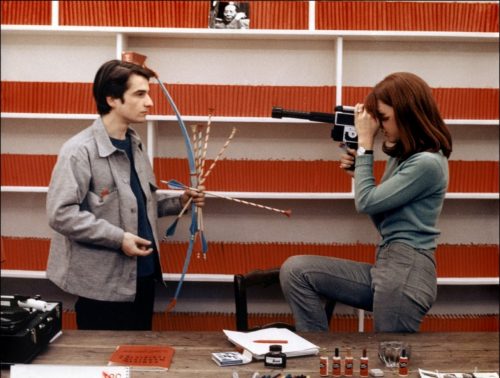Criterion Prediction #89: La Chinoise, by Alexander Miller
Title: La Chinoise
Year: 1967
Director: Jean-Luc Godard
Cast: Anne Wiazemsky, Jean-Pierre Léaud, Juliet Berto, Michel Semeniako, Lex De Bruijn, Omar Diop
Synopsis: A group of leftist students gathers and discusses their Marxist/Socialist ideals, applying them to the recently established Aden Arabie Cell, a Maoist revolutionary group. Around the time of Chairman Mao’s Cultural Revolution, mounting tensions in Vietnam, American imperialism and Brezhnev’s presiding over the Soviet Empire the five members of the Aden Arabie Cell debate the validity of violence and terrorism in their revolutionary cause.
Critique: Taking place almost entirely within an apartment, La Chinoise establishes itself with Godardian dressings from the start, with red, white and blue colored titles cards and wall breaking dialogue, indicating that this is a movie under construction, replete with shots of technicians, cinematographer Raoul Coutard, clapper boards, etc..
Within the first ten minutes of La Chinoise, you have Jean-Pierre Leaud spouting Marxist rhetoric, Maoist policies and literary allusions while broadcasts from Radio Peking fill the room; if this isn’t great Godard, it is certainly Godard at his most recognizable.
Following 2 or 3 Things I Know About Her, before the trenchant madness of Weekend, sits La Chinoise. A film that feels like the product of a director at odds with the medium; here he is upping his own ante, edging farther away from formal expression and loving every minute of it; the perverse joy is that he doesn’t really give a shit if people what he’s doing or not. So does that make La Chinoise and its take-it-or-leave-it aesthetic alluring in its audacity or is the film appealing on more grounded merits? Well, in this case, admiration was earned after some eye rolling through the first act and all of its timely political woes, boxed in locale, color coded setting (Godard’s penchant for red, white, blue is visible everywhere) felt blandly expressive, even tiring.
But the pendulum swung back and affection grew as La Chinoise progressed. Did Godard wear me down into liking this film or are there other forces at work?
I found myself more enamored by the growing allegories (from subtle to provocative), the playful interludes intercutting images of Batman and Nick Fury comics with that of the Cultural Revolution and Communist Propaganda. Toy battleships and tanks sporting American icons are literally bombarded with copies of Mao’s “Little Red Book.” Godard’s satirical edge didn’t soften or harden but folded into an introverted style of storytelling.
La Chinoise has some sting throughout the duration of its freewheeling narrative. Godard’s critique of youthful ineptitude comes off as less contentious and more animated when portraying the Aden Arabie cell as precocious young mouthpieces who, instead of taking it to the streets in the familiar student protest spirit, revert to revolutionary play-acting. It serves the director’s satirical pop-art aesthetic when characters build forts out of Mao’s “Little Red Book,” using Communist literature the same way a kid would make a fortress out of couch cushions.
Godard’s social critique carries itself with an unemphatic punchiness that takes off without anything to hold on to but shapes its political macro expressionism into a disarmingly funny if strange affair that requires some patience. Part of this admiration for La Chinoise comes from its choice in committing to blunt force political oration rather than masquerading as a flimsy narrative to trumpet broadly pedestrian ideals.
Why it Belongs in the Collection: Godard’s presence is important in The Criterion Collection, as it is in the overall conversation of film history. Criterion has a bulk of the director’s work indexed in its annals of classic spine numbers, while we hope for the inclusion of a few more titles (Le Petit Soldat, Les Carabiniers perhaps?) La Chinoise feels like one of the director’s better, later era efforts that has yet to receive the Criterion treatment.




























